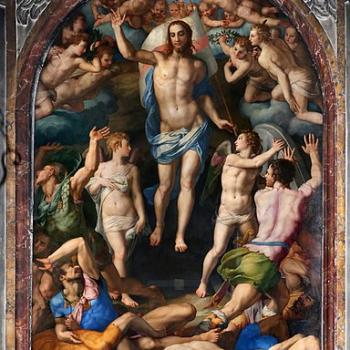
I first ran across former Christian minister and atheist John W. Loftus back in 2006. We dialogued about the problem of evil, and whether God was in time. During that period I also replied to an online version of his deconversion: which (like my arguments about God and time) he didn’t care for at all. I’ve critiqued many atheist deconversion stories, and maintain a very extensive web page about atheism. In 2007 I critiqued his “Outsider Test of Faith” series: to which he gave no response. Loftus’ biggest objection to my critique of his descent into atheism was that I responded to what he called a “brief testimony.” He wrote in December 2006 (his words in blue henceforth):
Deconversion stories are piecemeal. They cannot give a full explanation for why someone left the faith. They only give hints at why they left the faith. It requires writing a whole book about why someone left the faith to understand why they did, and few people do that. I did. If you truly want to critique my deconversion story then critique my book. . . . I challenge you to really critique the one deconversion story that has been published in a book. . . . Do you accept my challenge?
I declined at that time, mainly (but not solely) for the following stated reason:
If you send me your book in an e-file for free, I’d be more than happy to critique it. I won’t buy it, and I refuse to type long portions of it when it is possible to cut-and-paste. That is an important factor since my methodology is Socratic and point-by-point. . . . You railed against that, saying that it was a “handout.” I responded that you could have any of my (14 completed) books in e-book form for free.
Throughout August 2019, I critiqued Dr. David Madison, a prominent contributor to Loftus’ website, Debunking Christianity, no less than 35 times. As of this writing, they remain completely unanswered. I was simply providing (as a courtesy) links to my critiques underneath each article of Dr. Madison’s, till Loftus decided I couldn’t do that (after having claimed that I “hate” atheists and indeed, everyone I disagree with). I replied at length regarding his censorship on his website. Loftus’ explanation for the complete non-reply to my 35 critiques was this: “We know we can respond. It’s just that we don’t have the time to do so. Plus, it’s pretty clear our time would be better spent doing something else than wrestling in the mud with you.” He also claimed that Dr. Madison was “planning to write something about one or more of these links in the near future.” Meanwhile, I discovered that Dr. Madison wrote glowingly about Loftus on 1-23-17:
When the history of Christianity’s demise is written (it will fade eventually away, as do all religions), your name will feature prominently as one who helped bring the world to its senses. Your legacy is secure and is much appreciated.
This was underneath an article where Loftus claimed: “I’ve kicked this dead rodent of the Christian faith into a lifeless blob so many times there is nothing left of it.” I hadn’t realized that Loftus had single-handedly managed to accomplish the stupendous feat of vanquishing the Hideous Beast of Christianity (something the Roman Empire, Muslims, Communists, and many others all miserably failed to do). Loftus waxed humbly and modestly ten days later: “I cannot resist the supposition that my books are among the best. . . . Every one of my books is unique, doing what few other atheist books have done, if any of them.”
These last three cited statements put me “over the edge” and I decided to buy a used copy of his book, Why I Became an Atheist (revised version, 2012, 536 pages) and critique it, as he wanted me to do in 2006. Moreover, on 8-27-07 he made a blanket challenge about the original version of this book: “I challenge someone to try this with my book. I might learn a few things, and that’s always a goal of mine. Pick it up and deal with as many arguments in it that you can. Deal with them all if you can.” His wish is granted (I think he will at length regret it), and this will be my primary project (as a professional apologist) in the coming weeks.
Despite all his confident bluster, I fully expect him to ignore my critiques. It’s what he’s always done with me (along with endless personal insults). I’m well used to empty (direct) challenges from atheists, based on my experience with Madison and “Bible Basher” Bob Seidensticker, who also has ignored 35 of my critiques (that he requested I do). If Loftus (for a change) decides to actually defend his views, I’m here; always have been. And I won’t flee for the hills, like atheists habitually do, when faced with substantive criticism.
The words of John Loftus will be in blue.
*****
John Loftus’ chapter 4 is entitled, “Does God Exist” (pp. 79-102)
The atheist maintains that the material universe either popped into existence out of nothing, has always existed, is self-caused, or is just a natural brute fact arising form the laws of physics. . . . Atheist philosopher Quentin Smith claims that our universe came “from nothing, by nothing, and for nothing.” He argues that the universe caused itself to exist. (p. 79)
This is one of the very best arguments against atheism (simple and elegant). Even Loftus concedes on the same page that this view is “extremely unlikely — or possibly absurd.” Granted, he also thinks the view that “Something — anything — has always existed” (which would include an eternal God) can be described in the same way. But it’s quite notable and in my opinion, a huge concession in holding that atheist explanations of the existence of the universe are no more plausible or likely than the traditional Christian belief in creation of the universe (all things) by God.
Thanks, John! I’ve been making the same argument for at least 30 years: contending that both competing views of the origin of the universe (theistic and atheistic) cannot be absolutely proven, and require axioms: in effect, “faith.” Atheists routinely claim falsely and groundlessly that their view of ultimate origins is rational, “scientific,” and requires no faith, whereas ours (here it comes!) is irrational, anti-scientific (or at least non-scientific / non-empirical) and requires unsupported blind faith. Loftus cuts through that pretense, and I appreciate it. It’s a breath of fresh air. Both sides necessarily entail unproven axioms and non-empirical (purely philosophical and/or religious) starting-points.
[the classic ontological, cosmological, and teleological arguments (dealt with in pp. 81-97) are far too involved to delve into for my purposes, and others do a far better job, anyway, so I will leave the defenses of these three classic arguments up to them. Loftus mostly summarizes both espousals of these arguments and criticisms of them (i.e., he does little more than “survey the literature” from a thoroughly biased atheist perspective). I agree that none of them absolutely prove God’s existence. But considered together, I think they raise many troubling objections for the atheist to consider, and that the cumulative evidences suggest that God’s existence is far more probable and plausible than His non-existence]
I’m not certain some kind of god doesn’t exist. I just don’t think so. (p. 97)
Fair enough. There is still a little door open to convince him of God’s existence, then.
[T]his [the teleological / design argument] was the same argument that convinced a possibly stroke-affected Antony Flew to become a deist before he died, after being possibly the leading atheist thinker of the last century. (p. 97)
I’ve been looking and looking, with all the search capabilities of the modern Internet, and I can’t find anything about Flew having had a stroke at all: let alone one that would affect his reasoning, so that he would become a deist. I’d love to know where Loftus discovered this alleged bit of information, and how verified it is. The closest I got was a reference in the Wikipedia article about Flew, that referenced “an article in The New York Times Magazine alleging that Flew’s intellect had declined due to senility, . . .”
Following the link to the article (dated 4 November 2007), I see that the words “senility” or “senile” never appear in it; nor does “dementia.” It makes passing references to his “memory failing” / “his powers in decline” / “halting” diction and a mind “in decline” (he was then 84). But all this — even if true — is far, far from alleging the serious claim that a stroke affected his philosophical reasoning ability. So where did Loftus acquire such a belief: even if it is only speculative?
The same article notes that well-known atheist Richard Carrier wrote to Flew in 2001, and that Flew replied on the 3rd of September: “I have for a long time been inclined to believe in an Aristotelian God who (or which) does not intervene in the Universe.” He was at that time 78, so whatever “a long time” means, it is clear that the essence of his change of mind was not “before he died” (implied: right before; stroke or no). Nice try!
Thus, to uphold this hypothesis, one would have to establish that Flew suffered a stroke before whatever year his “Aristotelian god” inclination began (a “long time” before he reached age 78: so he himself stated). It doesn’t look very hopeful. But atheists had to come up with something to discredit Flew’s newfound belief (I documented a good deal of this at the time in a discontinued paper of mine), and so Loftus gives us this nothing burger.
[following an argument from Richard Dawkins] Of course, if evolution is unguided, then God doesn’t exist.” (p. 97)
This doesn’t follow at all, and is a strikingly weak argument to make. There is no necessity that I can see for God (if He exists) to be compelled to “guide evolution.” If God is only a deist-type god, a la the “late period Flew” or David Hume (who accepted a form of the teleological argument), then by definition He would not guide it, since deism posits a God Who creates and then withdraws from any governance or supervision of His creation (His providence and sovereignty are denied). But even a full theistic and biblical God wouldn’t have to literally guide evolution (however such a thing is construed). He could simply have put the potentialities into matter that would enable it to evolve and bring about all that we see today. St. Augustine was pondering that live possibility 1600 years ago.
This God . . . had a body that needed to rest on the seventh day and was found walking in the “cool of the day” in the Garden of Eden . . . Still later, the God of the Bible was stripped of physical characteristics and became known as a spiritual being (John 4:21-24), although he may have been thought of as an embodied God when impregnating Mary . . . (p. 102)
Loftus, like probably 50 other atheists I’ve interacted with, doesn’t have a clue about biblical anthropomorphism and anthropopathism. This is part of the profoundly ignorant (almost universal) atheist misunderstanding of the many biblical literary genres and ways of expression. It’s all the more case if an atheist came out of fundamentalism, since they never understood or fully understood these factors even as a Christian.
This also gets into the related involved topics of theophanies and the angel of the Lord [see section II, part 3 in the link, and see also a second article] as God’s representative, which I have written about. It’s not likely that Loftus has much of an understanding of these matters, and the standard Christian / biblical view that God the Father is invisible: at least not from these particular out-to-sea “parting shot” statements in this chapter. We’ll see if he exhibits any better understanding of these more advanced matters in theology, as we proceed through the book.
It’s beyond ludicrous to claim that Christians ever believed that a supposedly physical God the Father impregnated Mary (best I can tell, this is what Loftus meant). In Christian belief from the start, she became pregnant by the Holy Spirit (Matthew 1:18: “she was found to be with child of the Holy Spirit”: RSV): and a spirit is what it is. The Holy Spirit is immaterial and He has no body. So this is truly beyond the pale. Bringing about a miraculous pregnancy in Mary no more requires a “physical” God the Father or Holy Spirit than creation does. Loftus is just pulling these things out of a hat.
Lastly, Loftus is getting way ahead of himself in bringing up trinitarianism in a chapter about the theistic arguments, since virtually all Christians would readily agree that those arguments do not establish a trinitarian God (though they are consistent with that). Rather, the Holy Trinity is revealed in God’s inspired revelation: the Bible. It’s not the conclusion of a philosophical argument.
***
Photo credit: John Loftus at SASHAcon 2016 at the University of Missouri; Mark Schierbecker (3-19-16) [Wikimedia Commons / Creative Commons Attribution-Share Alike 4.0 International license]
***













